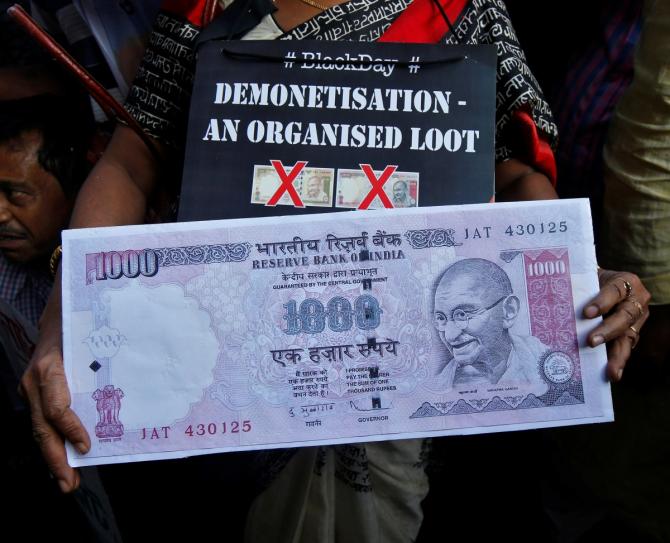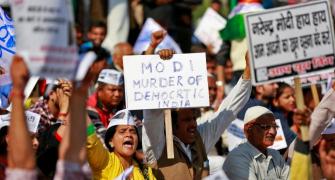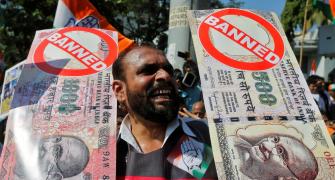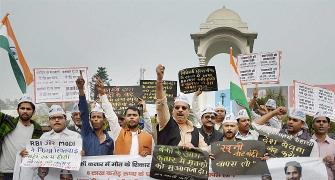In a big win for the Narendra Modi government, the Supreme Court in a 4:1 majority verdict on Monday gave its stamp of approval to the Centre's 2016 decision to demonetise the Rs 1,000 and Rs 500 denomination currency notes, saying the decision-making process was neither flawed nor hasty.

After scrutinising the entire record on demonetisation, a singularly seismic economic policy decision that triggered a slowdown, the apex court said the decision to scrap the high-value currency notes did not suffer from flaw or illegality as there was consultation between the Reserve Bank of India (RBI) and the Union government for a period of six months before the impugned notification was issued.
The top court said it was of considered view after the perusal of the material on record that the RBI's Central Board had taken into consideration the relevant factors while recommending withdrawal of the legal tender.
Observing that the scope of judicial review in matters of economic policy is 'narrower', a five-judge Constitution bench headed by Justice S A Nazeer said there has to be great restraint in matters of economic policy and the court will not interfere with any opinion formed by the government if it is based on the relevant facts and circumstances or on expert advice.
Justice B V Nagarathna, however, dissented and said the demonetisation of the Rs 500 and Rs 1,000 currency notes was 'vitiated and unlawful'.
"In my view, the power of the central government being vast has to be exercised through a plenary legislation rather than by an executive act by issuance of notification. It is necessary that Parliament, which consists of the representatives of the people of the country, discusses the matter and thereafter, approves the matter," Justice Nagarathna said.
Justice Nagarathna, who was the junior-most judge on the Constitution bench, said there was no independent application of mind by the RBI and the entire exercise was carried out in 24 hours.
The top court's judgment came on a batch of 58 petitions including the one filed by lead petitioner Vivek Narayan Sharma challenging the demonetisation exercise.
The bench, also comprising justices B R Gavai, A S Bopanna and V Ramasubramanian, said the notification dated November 8, 2016, by which the high-value currency notes were scrapped, cannot be termed unreasonable and struck down on the ground of a flawed decision-making process.
It added the decision had a reasonable nexus with its objectives, such as eradicating black money, terror funding etc., and it is not relevant whether those objectives were achieved or not.
The apex court said the 52-day window provided for the exchange of the demonetised notes with legal tenders was not unreasonable and it cannot be extended now.
Some of the petitioners had sought a fresh window to be opened for the exchange of the scrapped currency notes.
'The power available to the central government under sub-section (2) of Section 26 of the RBI Act cannot be restricted to mean that it can be exercised only for 'one' or 'some' series of bank notes and not for 'all' series of bank notes. The power can be exercised for all series of bank notes.
'Merely because on two earlier occasions the demonetisation exercise was by plenary legislation, it cannot be held that such power would not be available to the central government,' the 382-page majority verdict said.
The court said section 26(2) of the RBI Act does not provide for excessive delegation as there is an in-built safeguard that such a power has to be exercised on the recommendation of the RBI's Central Board and as such cannot be struck down.
'The impugned Notification dated November 8, 2016 satisfies the test of proportionality and, as such, cannot be struck down on the said ground. The period provided for exchange of notes vide the impugned Notification dated November 8, 2016 cannot be said to unreasonable,' it said.
In the test of proportionality, courts can quash exercise of discretionary powers where there is no reasonable relation between the objective which is sought to be achieved and the means used to that end.
'The period provided by the impugned notification cannot be said to be unreasonable. The RBI does not possess independent power to accept the demonetised notes beyond the specified period. We direct the registry to place the matter before the CJI for placing before the appropriate bench,' the court said.
Commenting on the procedure adopted by the Centre in the entire exercise, the apex court said all the relevant factors were placed for consideration before the Union cabinet when it took the decision to demonetise.
'We are of the considered view that the contention that the decision-making process suffers from non-consideration of relevant factors and eschewing of the irrelevant factors, is without substance,' the bench said while rejecting the submission of the petitioners.
It also junked the contention that there was lack of quorum in the meeting of the RBI's Central Board dated November 8, 2016.
The top court said it cannot be disputed that the final say with regard to economic and monetary policies of the country will be with the central government.
'However, in such matters, it has to rely on the expert advice of the RBI. In a matter like the present one, it cannot be expected that the RBI and the Central Government will act in two isolated boxes. An element of interaction/consultation in such important matters pertaining to economic and monetary policies cannot be denied to the RBI and the central government,' the bench said.
The majority verdict said the court must defer to legislative judgment in matters related to social and economic policies and must not interfere unless the exercise of executive power appears to be palpably arbitrary.
'The court does not have necessary competence and expertise to adjudicate upon such economic issues. It is also not possible for the court to assess or evaluate what would be the impact of a particular action and it is best left to the wisdom of the experts.
In such matters, it will not be possible for the Court to assess or evaluate what would be the impact of the impugned action of demonetisation. The Court does not possess the expertise to do so,' it said.
Mere errors of judgment by the government seen in retrospect is not subject to judicial review, it added.
On the issue of hardships suffered by citizens during demonetisation, the apex court said if the impugned notification had a nexus with the objectives to be achieved, then, merely because some citizens have suffered through hardships would not be a ground to hold the impugned notification to be bad in law.
'The decision-making process is also sought to be attacked on the ground that the decision was taken in a hasty manner. We find that the 'hasty' argument would be destructive of the very purpose of demonetisation.
'Such measures undisputedly are required to be taken with utmost confidentiality and speed. If the news of such a measure is leaked out, it is difficult to imagine how disastrous the consequences would be...It can thus be seen that confidentiality and secrecy in such sort of measures is of paramount importance,' the bench said.
Contending that it is not the function of the court to sit in judgment over matters of economic policy, the apex court said such issues must necessarily be left to the government of the day to decide and the courts can certainly not be expected to decide them without even the aid of experts.
'In the present case also, the delegation is to the central government, i.e. the highest executive body of the country. We have a Parliamentary system in which the Government is responsible to the Parliament.
'In case the Executive does not act reasonably while exercising its power of delegated legislation, it is responsible to Parliament who are elected representatives of the citizens for whom there exists a democratic method of bringing to book the elected representatives who act unreasonably in such matters,' the bench said.
Arguably one of the most disruptive economic policy decisions, the demonetisation exercise had brought the country to its knees with innumerable industrial units and businesses shutting down leading to huge loss of livelihood.
Panicked citizens rushed to banks to exchange the demonetised currency notes and stood in seemingly unending queues to withdraw money from ATMs, with many reportedly dying from fatigue and exhaustion while waiting for their turn.









